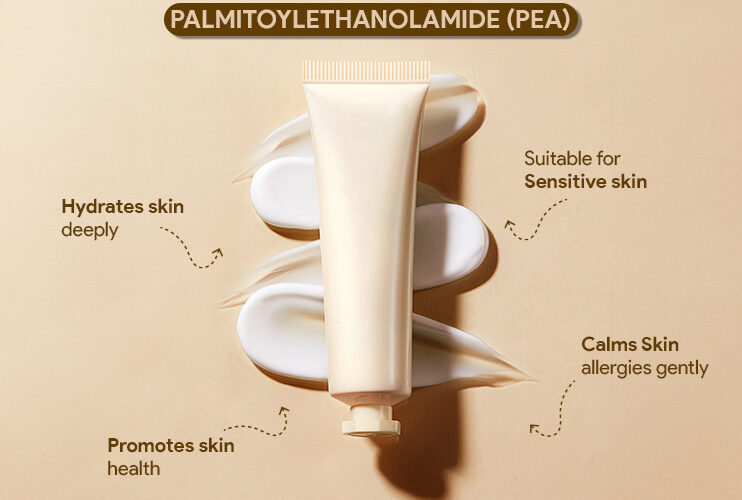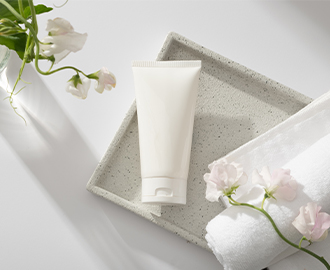Understanding Palmitoylethanolamide (PEA) In Skincare: A Moisturizing Marvel
Unveiling the Skin’s Superhero
In the world of skincare, Palmitoylethanolamide, also known as PEA, has emerged as a powerhouse ingredient, not only for its obscure name but also for its incredible benefits for the skin. Despite its complex-sounding scientific title, the magic lies in its ability to moisturize and combat pesky allergies, rendering it a superhero in skincare.
What is Palmitoylethanolamide (PEA)?
PEA is a naturally occurring fatty acid amide produced within the body to maintain balance and homeostasis. Remarkably, it’s also found in various foods like egg yolks and peanuts. But what makes it so intriguing is its capacity to influence the body’s natural responses, especially when it comes to skin health.
Moisturizing Marvel: PEA’s Hydrating Charm
Research suggests that PEA plays a pivotal role in maintaining the skin’s moisture levels. Unlike many moisturizers that work on the surface, PEA dives deeper, supporting the skin’s natural lipid barrier. This helps in preventing moisture loss and keeping the skin supple and hydrated, making it a savior for dry, parched skin. Clinical studies highlights PEA’s ability to enhance skin hydration, demonstrating its potential as a groundbreaking ingredient in skincare products.1 & 2

Combatting Allergies: PEA’s Soothing Touch
Ah, those pesky allergies! Whether it’s redness, itchiness, or irritation, they can wreak havoc on the skin. Fear not, for PEA comes to the rescue yet again. Studies, such as those by Skaper et al. (2014) and Impellizzeri et al. (2016), indicate that PEA possesses potent anti-allergic and anti-inflammatory properties. By modulating certain pathways in the body, PEA helps alleviate allergic reactions, soothing the skin and restoring its calmness.
Incorporating PEA into Your Skincare Routine
Now that the secret’s out, you might wonder how to integrate this superhero ingredient into your skincare regimen. Look for skincare products containing PEA or its derivatives. Whether it’s creams, serums, or lotions, these formulations harness the power of PEA to deliver its benefits effectively.
Key benefits of Palmitoylethanolamide (PEA) in skincare
Moisturizing Marvel: PEA supports the skin’s natural lipid barrier, aiding in moisture retention. It prevents dehydration, keeping the skin supple and hydrated.
Anti-Allergic Support: PEA possesses anti-inflammatory properties that help soothe allergic reactions on the skin. It reduces redness, itchiness, and irritation, promoting a calmer complexion.
Promotes Skin Health: By modulating certain pathways in the body, PEA contributes to skin health, addressing various concerns from dryness to hypersensitivity, promoting a healthier overall appearance.
Gentle Skincare Solution: PEA is generally well-tolerated, making it suitable for various skin types, including sensitive skin. It offers gentle yet effective support for improved skin conditions without harsh side effects.
Embrace the Power of PEA for Radiant Skin
Palmitoylethanolamide might have a name that’s a mouthful, but its benefits for skincare speak volumes. From hydrating dry skin to calming allergic reactions, its prowess in promoting healthy and radiant skin is backed by scientific research.
FAQs:
- How does Palmitoylethanolamide (PEA) benefit skin hydration?
PEA aids in maintaining the skin’s moisture levels by supporting its natural lipid barrier, preventing moisture loss and keeping the skin hydrated and supple.
- Can Palmitoylethanolamide (PEA) help with allergic reactions on the skin?
Yes, PEA possesses anti-allergic properties that can help alleviate skin allergies. It works by modulating certain pathways in the body, soothing irritation, redness, and itchiness.
- Are there specific skincare products that contain Palmitoylethanolamide (PEA)?
Yes, there are skincare products such as creams, serums, and lotions formulated with PEA or its derivatives. These products harness the moisturizing and anti-allergic benefits of PEA for effective skincare.
- Is Palmitoylethanolamide (PEA) safe for sensitive skin types?
PEA is generally well-tolerated and suitable for sensitive skin. However, it’s advisable to perform a patch test before using new skincare products containing PEA to ensure compatibility with your skin.

